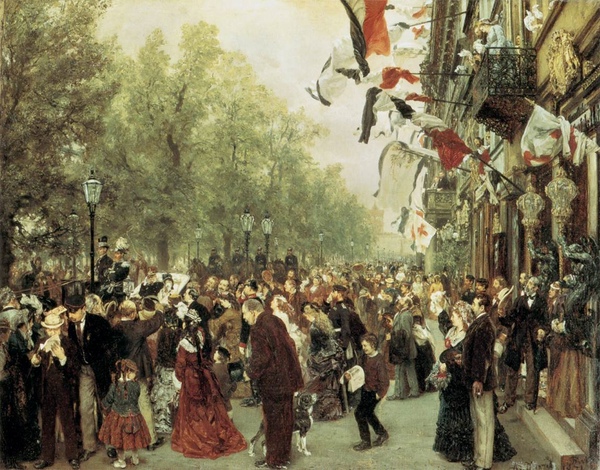
Es gibt eine reichsdeutsche Geschichtsschreibung, es gibt, fürchte ich, selbst eine antisemitische, – es gibt eine Hof-Geschichtsschreibung und Herr von Treitschke schämt sich nicht… Jüngst machte ein Idioten-Urteil in historicis, ein Satz des zum Glück verblichenen ästhetischen Schwaben Vischer, die Runde durch die deutschen Zeitungen als eine »Wahrheit«, zu der jeder Deutsche ja sagen müsse: »Die Renaissance und die Reformation, beide zusammen machen erst ein Ganzes – die ästhetische Wiedergeburt und die sittliche Wiedergeburt.« – Bei solchen Sätzen geht es mit meiner Geduld zu Ende, und ich spüre Lust, ich fühle es selbst als Pflicht, den Deutschen einmal zu sagen, was sie alles schon auf dem Gewissen haben. Alle großen Kultur-Verbrechen von vier Jahrhunderten haben sie auf dem Gewissen!… Und immer aus dem gleichen Grunde, aus ihrer innerlichsten Feigheit vor der Realität, die auch die Feigheit vor der Wahrheit ist, aus ihrer bei ihnen Instinkt gewordenen Unwahrhaftigkeit, aus »Idealismus«.
There is an imperial German historiography, indeed, I fear, an anti-Semitic one, — there is a court historiography, and Mr von Treitschke knows no shame… recently an idiotic judgment in historical matters, a sentence by the Swabian esthete Vischer, now fortunately faded from the scene, made its rounds in the German newspapers as a “truth” which every German should recognize: “The Renaissance and the Reformation must be joined together to make a whole—the esthetic rebirth and the moral rebirth.” – I lose patience when I hear such sentences, and I feel a desire, indeed, a duty, to tell the Germans all the things they have on their conscience! All the great cultural crimes of four centuries are on their conscience!… And always for the same reason, because of their internalized cowardice in the face of reality, which is also a cowardice in the face of the truth, which they have made into their instinctive untruth, from “idealism.”
—Friedrich Nietzsche, Ecce Homo, Der Fall Wagner—Ein Musikantenproblem (1888)(S.H. transl.) in Werke in drei Bänden, vol. ii, p. 1147 (K. Schlechta ed. 1954)
Friedrich Nietzsche’s writings, and especially his late works, suspended in a space between genius and insanity, present a serious challenge to the reader. They can certainly be mined for brilliant thoughts. On the other hand, ripped from their historical context, they are easily misunderstood. This passage from Ecce Homo, an especially problematic work of genius veering into the delusional, is a good example. What does Nietzsche mean, in 1888, when he writes of the “cultural crimes” of four centuries? What of “cowardice in the face of reality.” What of the “idealism” he puts in quote marks?
C.H. Beck has recently published a three-day conversation between former German chancellor Helmut Schmidt and historian Fritz Stern. In it, they talk about the Germany they experienced in the twentieth century. This passage from Ecce Homo is quoted, criticized, discussed and applied, with remarkable effect, to better understand the Germany of Nietzsche’s day and the century that followed. Their book, called Unser Jahrhundert (Our Century) carries the subtitle “A Conversation”—but it could just as easily be called “Thirty-One Variations on a Theme by Friedrich Nietzsche.”
Clearly Nietzsche is criticizing German historians as a class, and arguing that they have a crude sense for the cultural ramifications of historical developments. He portrays them as being in the service of certain interests—in particular of the Hohenzollerns and their military and industrial allies, of the interests that created the Second Reich in 1871, marking the emergence of Germany as a nation-state. That would certainly hit the mark for the historian Heinrich von Treitschke, whom he names–a typical figure of the German professorial order who completed the transition from engaged liberal in the spirit of ’48 to national-conservative propagandist for the house of Hohenzollern. The reader with a sense of this historical context will make quick work of the passage, but a less informed reader might be confused by it. Nevertheless, Stern and Schmidt are agreed that Nietzsche not only articulates a penetrating criticism of his own day—his observation has much to say for the German experience in the next several generations.
What does Nietzsche mean by “four centuries”? As Stern explains, this reflects his attitude towards Martin Luther and Lutheranism as a corrupting influence (for the “Antichrist” Nietzsche, the fact that Luther salvaged Christianity is, of course, a tragedy), but it is clearly a great exaggeration. Schmidt notes that it would be absurd to suggest that four hundred years of German history were a prelude that necessarily led to what was really one of the great cultural crimes of world history, namely, the Holocaust.
stern: I am convinced that Hitler, National Socialism, and the Holocaust were neither coincidental nor unavoidable. On this point, I share your view: the thought that a direct line leads from Luther to Hitler is a pronounced stupidity—but Luther’s anti-Semitism was not without consequences just the same. There were roots. Anti-Semitism in Europe had a long, long history… I believe that the Nazis were themselves amazed at how easily everything proceeded after January 30, 1933. Just think of the book burnings at the universities…
schmidt: A partial explanation: the students who organized that were part of a hysterical mob. A further partial explanation: the Germans had been raised to be obedient to the state. And in this manner there are a thousand other explanations, but in the end it remains unexplained. This inexplicability troubles me very deeply!
…
stern: Nietzsche’s “cowardice before the truth” belongs to this. The reality was that the Nazis ruled by arresting those who thought differently, their former political enemies, or Jews, anyone who didn’t suit them.
In a later passage, Stern and Schmidt discuss this concept of “cowardice before the truth” as it was reflected in the decisive days of 1918-19. Germany lost the Great War on the Western Front after winning it on the Eastern Front. The Second Reich collapsed. The Weimar Republic was founded.
stern: [Nietzsche’s] phrase about “cowardice before the truth” was expressly confirmed in 1918-19, when a great part of the German citizenry refused to recognize the reasons for their own defeat.

Stern is talking about the birth of the Dolchstoßlegende, the fable that German soldiers on the front had been “stabbed in the back” by political figures at home—especially “leftists and Jews.” Of course Germany had become a de facto military dictatorship by 1917, and the idea that “leftists and Jews,” unpatriotic and subversive, had undermined army morale was risible. Moreover, it was completely clear that the entry of America into the war on the side of the allies had decidedly tilted the balance against Germany, sealing her doom in military terms. But the Dolchstoßlegende was wielded by German’s reactionary right as a powerful political tool to undermine the legitimacy of the Weimar Republic and ultimately to bring it down. And indeed, in various forms, it has been a favorite screed for rightists and militarists in other countries around the world ever since.
The Nietzschean premises also figure in discussion of the abdication of Kaiser Wilhelm; the collapse of the government following the fateful decision to seek an increase in unemployment insurance contributions in 1930; Helmut Kohl’s failure to brace the German people for the heavy cost and consequences of unification with the East; the role of morality in politics; and the need for political truth-telling. The last offers one of the most fascinating passages of the Stern-Schmidt dialogue. “The Germans have a particular history of concealing the truth,” Schmidt concedes, “but it is a weakness of every democracy that a politician who confronts the voters with unpleasant truths significantly reduces his chances of being re-elected.” The resulting discussion over the politician’s need to balance respect for the truth and the long-term interests of his people with the short-term interests of electoral politics can only be termed a remarkable clash between sharp historical insight and pragmatic partisan politics.
Public affairs dialogues are a staple of modern political life. They fill the Sunday airwaves in America and Europe and are an essential aspect of policy formation. Much of what one hears in them is, however, predictable tripe. Little is worthy of being remembered a year later. The Schmidt-Stern dialogue is an exception, because it brings the format closer to the high literary style of Boswell and Eckermann. It is encompassed by an aura of wisdom and offers insights in every sitting that unlock the mystery of Germany’s past, and teach lessons that may well apply beyond her borders. What, one wonders, would Friedrich Nietzsche think about the use of his writings as an analytical engine? I suspect he would be delighted. Nietzsche of course tells us that he is a warrior in his inner-self, while Stern and Schmidt are civil to the core. But they share a razor-sharp analysis.
What music does Nietzsche have in mind when he talks about “four centuries of cultural crimes?” The words appear in a discussion of his denunciation of Richard Wagner, and while the secondary conversation relates to historians, the primary thread goes to musicians. He gives us some personalities and works to think about, and I’ll take the music appropriate to Holy Week, which begins tomorrow–the observation of which surely have provoked Nietzsche to snarling outbursts. Nietzsche starts with a reference to Heinrich Schütz, “one of the most genuine and most German of musicians, in the old sense of the word German.” Whether this is genuine admiration or sarcasm, we can’t be sure, though I’d say it’s genuine. Schütz was one of the greatest composers of the period before Bach. His work is filled with spirituality and mathematical precision, it is music that Nietzsche would reckon to the Apollonian mode. Moreover, as Nietzsche is writing in 1888, Schütz is being rediscovered and performed in Leipzig (a fact to which Nietzsche alludes). One of the works then being documented and performed stands at the beginning of the tradition of German passion music, which reached its zenith with Bach’s Matthew Passion. Schütz’s work is called the Historia der fröhlichen und siegreichen Auferstehung unsers einigen Erlösers und Seligmachers Jesu Christi and it was first performed in 1623, when he was 38 years old:
And now for an example of the “Wagnerian betrayal,” “no longer the sound of Dionysus’s flutes,” listen to the Good Friday music from act iii of Parsifal (1882), performed by Kurt Moll:


